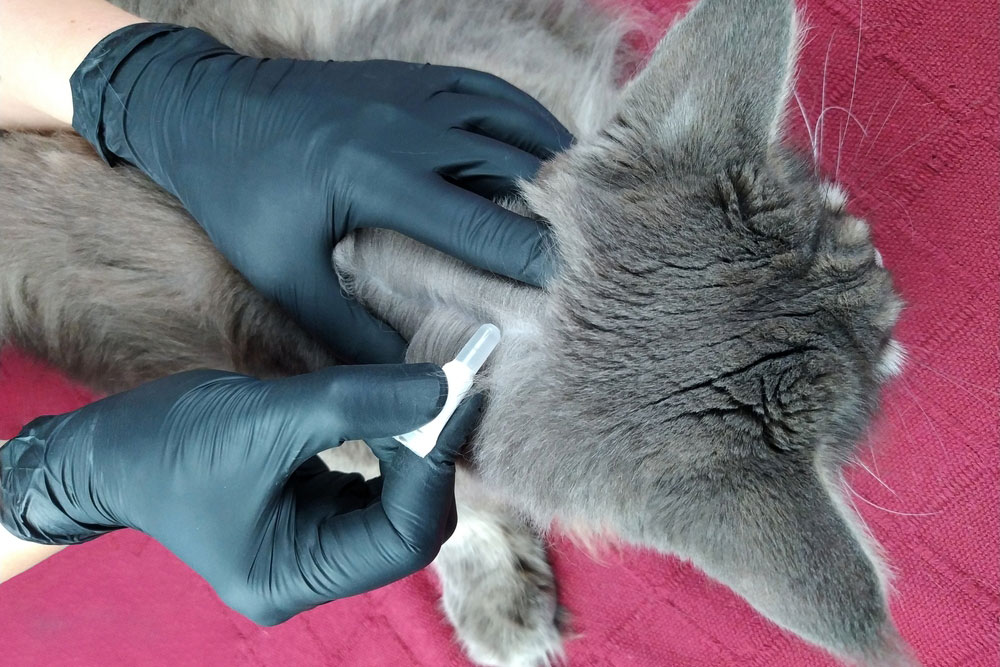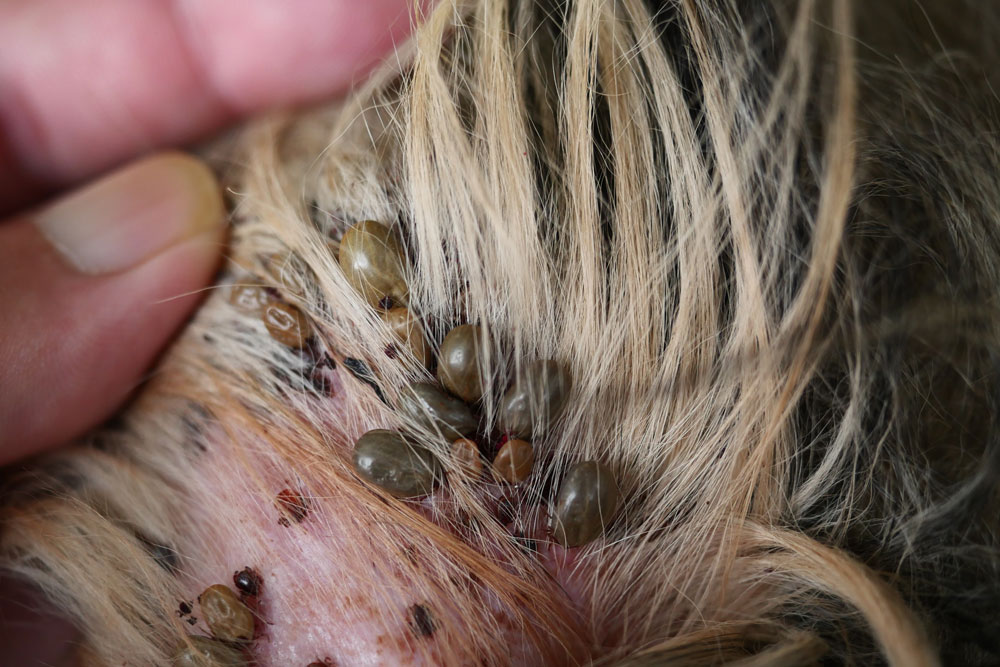Protecting Your Pet from Parasites: Fleas, Ticks, Mites, and Worms
Understanding Common Parasites in Pets
Parasites like fleas, ticks, mites, intestinal worms, and heartworms are more than just nuisances—they pose serious health risks to pets. Left untreated, they can cause discomfort, infections, and even life-threatening conditions. Implementing a year-round parasite prevention plan is essential to keep your pet healthy and protect them from potential diseases.
Fleas: More Than Just an Itch
Fleas are small, blood-sucking parasites that can quickly infest both pets and homes. A single female flea can lay up to 50 eggs per day, making infestations difficult to control if left untreated.
Health Risks of Fleas
- Flea Allergy Dermatitis (FAD): An allergic reaction to flea saliva, causing intense itching, hair loss, and skin infections.
- Tapeworm Transmission: Fleas can carry tapeworm larvae, which infect pets when ingested during grooming.
- Anemia: Severe infestations in puppies, kittens, or small animals can lead to life-threatening blood loss.
Flea Prevention and Treatment
- Use vet-approved flea preventatives (oral medications, topical treatments, or flea collars).
- Keep bedding, carpets, and furniture clean to reduce flea populations.
- Regularly check your pet’s coat for signs of fleas or flea dirt.
- Use vet-approved flea preventatives (oral medications, topical treatments, or flea collars).
- Keep bedding, carpets, and furniture clean to reduce flea populations.
- Regularly check your pet’s coat for signs of fleas or flea dirt.
Learn more about Flea Allergy Dermatitis in Dogs and Cats.
Ticks: A Tiny but Serious Threat
Ticks attach to pets and feed on their blood, potentially transmitting serious diseases, including:
- Lyme Disease: Can cause joint pain, fever, and kidney complications.
- Ehrlichiosis: A bacterial infection leading to fever, lethargy, and weight loss.
- Rocky Mountain Spotted Fever: A severe illness affecting blood vessels and organ
Signs of Tick-Borne Diseases
- Fever and lethargy
- Swollen joints or limping
- Sudden loss of appetite
- Neurological symptoms (seizures or weakness)
Tick Prevention and Removal
- Use tick preventatives year-round, even in colder months.
- Inspect your pet after outdoor activities, especially in wooded or grassy areas.
- Remove ticks properly using tweezers, grasping close to the skin and pulling straight out.
- Use tick preventatives year-round, even in colder months.
- Inspect your pet after outdoor activities, especially in wooded or grassy areas.
- Remove ticks properly using tweezers, grasping close to the skin and pulling straight out.
Learn about preventing ticks on pets.
Mites: The Hidden Irritants
Mites are microscopic parasites that cause various skin and ear conditions in pets.
Common Types of Mites
- Ear Mites: Highly contagious, causing ear scratching, dark discharge, and head shaking.
- Sarcoptic Mange (Scabies): Causes extreme itching, hair loss, and crusty skin.
- Demodectic Mange: Leads to hair thinning, skin redness, and bacterial infections.
Prevention and Treatment
- Routine vet visits to catch early signs of mite infestations.
- Topical or oral medications prescribed by your veterinarian.
- Keep your pet’s living environment clean to prevent re-infestation.
Intestinal Parasites: The Hidden Threat
- Routine vet visits to catch early signs of mite infestations.
- Topical or oral medications prescribed by your veterinarian.
- Keep your pet’s living environment clean to prevent re-infestation.
Intestinal Parasites: The Hidden Threat
Intestinal parasites such as roundworms, hookworms, and tapeworms live in the digestive tract and may cause:
- Diarrhea or vomiting
- Poor coat condition
- Weight loss despite a good appetite
- Bloated stomach (common in puppies and kittens)
How Do Pets Get Intestinal Parasites?
- Ingesting infected soil, feces, or prey animals
- Fleas carrying tapeworm larvae
- Puppies and kittens can be born with parasites passed from their mother
Prevention and Treatment
- Routine deworming as recommended by your veterinarian.
- Fecal testing to detect parasites early.
- Good hygiene practices – clean litter boxes, pick up waste promptly, and prevent pets from eating unknown substances.
- Routine deworming as recommended by your veterinarian.
- Fecal testing to detect parasites early.
- Good hygiene practices – clean litter boxes, pick up waste promptly, and prevent pets from eating unknown substances.
Learn more about intestinal parasites in cats and dogs.
Heartworm: A Silent but Deadly Threat
Heartworm disease is a serious and potentially fatal condition caused by parasitic worms that live in the heart, lungs, and blood vessels of infected animals. It is transmitted through mosquito bites and is 100% preventable with proper care.
Why Heartworm Prevention Is Essential
- Heartworms cause irreversible heart and lung damage.
- Treatment is costly, invasive, and can be dangerous for pets.
- Even indoor pets are at risk since mosquitoes can enter homes.
Learn more about heartworm disease from the American Heartworm Society.
Heartworm Risk in Your Area
Heartworm cases have increased nationwide, despite the availability of effective preventatives. Check the Canine Heartworm Prevalence Map to assess heartworm risk in your area.
Signs of Heartworm Disease
- Mild persistent cough
- Fatigue after mild exercise
- Weight loss and reduced appetite
- Swollen abdomen (due to heart failure)
Learn more about heart disease symptoms in dogs.
Prevention and Treatment
- Year-round heartworm preventatives (oral or injectable).
- Annual heartworm testing to detect early infections.
- Avoid mosquito exposure by using pet-safe repellents.
Are we doing enough to prevent heartworm infections?

Why Year-Round Parasite Prevention Matters
Many pet owners assume parasite control is only necessary in warm months, but fleas, ticks, intestinal parasites, and heartworms thrive year-round, even indoors.
Consistent prevention protects your pet from infestations and infections, reducing the risk of serious health complications.
Discover the importance of year-round parasite prevention.
Protect Your Pet from Parasites
Keeping your pet parasite-free is one of the best ways to ensure their long-term health.
Schedule today at Valley Center Veterinary Clinic!
- Year-round parasite prevention
- Expert veterinary care
- Customized protection plans
Don’t wait until parasites become a problem—prevention is the best medicine!







Leave A Comment